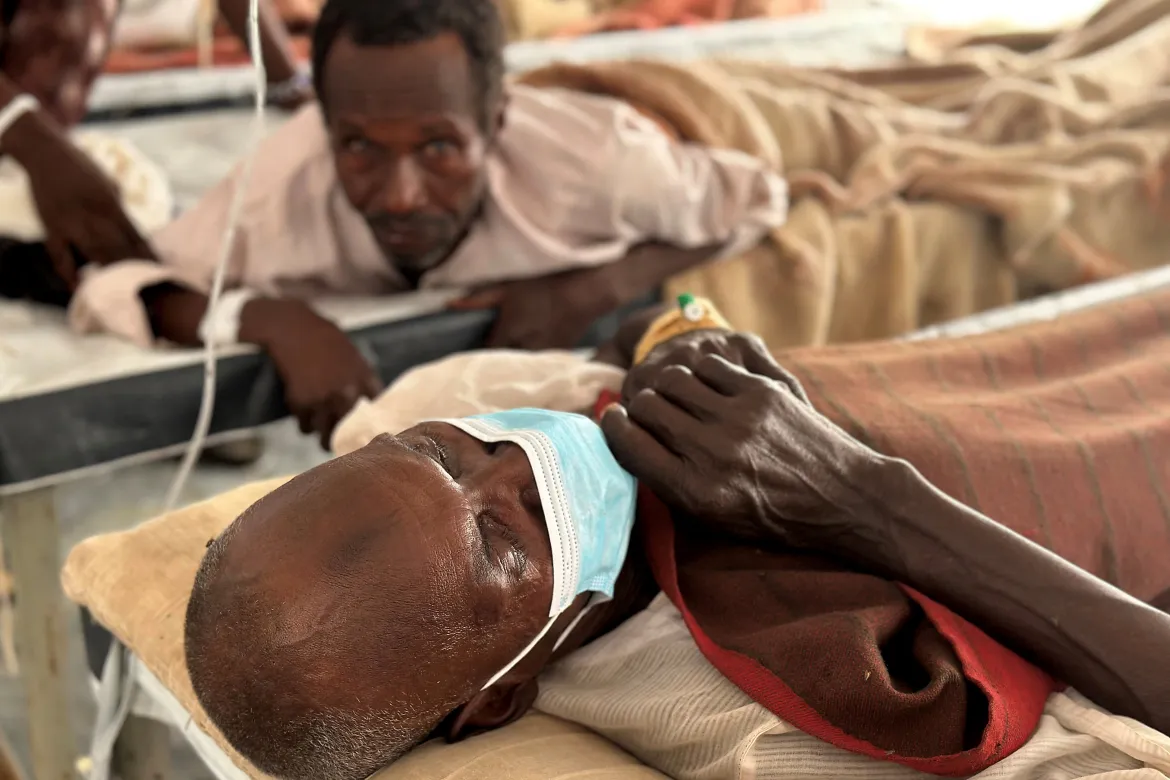A deadly cholera outbreak is sweeping through Sudan’s refugee camps, turning already dire living conditions into a public health disaster. The cholera crisis is spreading fast in Tawila, Darfur, where tens of thousands of displaced families struggle without clean water, proper shelter, or medical supplies.
Rapid Spread of Infection
In Tawila’s makeshift camps, fear grows by the hour. The disease spreads faster than aid can arrive. Even after water is boiled, contamination quickly returns as flies swarm over food and supplies. For many families, boiling water is their only defense against the deadly bacteria.
Residents have turned to improvised remedies. “We mix lemon in the water when we have it and drink it as medicine,” said Mona Ibrahim, a displaced mother who has lived in the camp for two months. Sitting on bare earth, she explained there was no alternative.
Mass Displacement and Vulnerability
Nearly 500,000 people fled to Tawila in April after attacks by the paramilitary Rapid Support Forces (RSF). Many came from the besieged city of El-Fasher and the Zamzam displacement camp. The RSF’s conflict with Sudan’s army, which began in April 2023, has left civilians with no safe refuge and little access to healthcare.
The overcrowded conditions have created the perfect environment for cholera to thrive. Families live in cramped shelters without proper sanitation. With the rainy season in full swing, contaminated floodwaters mix with scarce drinking water supplies.
Outbreak Timeline
The first cholera cases in Tawila were detected in early June in Tabit, a village 25km (16 miles) south of the town. According to Sylvain Penicaud, a project coordinator for Doctors Without Borders (MSF), it took just two weeks for the infection to spread into Tawila itself. Soon after, cases began to appear across the displacement camps.
In the past month alone, MSF has treated over 1,500 patients in Tawila. The United Nations Children’s Fund (UNICEF) reports that since April, about 300 children in the area have contracted the disease.
Children at High Risk
The outbreak poses the gravest danger to young children. Across North Darfur state, UNICEF estimates that more than 640,000 children under five are at risk. Malnutrition and weakened immune systems make them especially vulnerable to dehydration and death from cholera.
Read: New COVID Variant Causes ‘Razor Blade’ Throat
By the end of July, UN data showed 2,140 confirmed infections and at least 80 deaths across Darfur. Health officials warn the actual figures may be higher due to underreporting and limited testing capacity in remote areas.
Health System Under Pressure
Medical services in Darfur were already stretched thin before the outbreak. Years of conflict have destroyed hospitals, disrupted supply chains, and forced healthcare workers to flee. Now, the sudden surge in cholera cases is overwhelming the few facilities still operating.
In Tawila’s cholera isolation center, patients lie on thin mattresses, receiving oral rehydration salts or intravenous fluids. Supplies are scarce, and doctors often improvise equipment. “We are doing what we can,” said Penicaud. “But without more resources, we cannot keep up with the pace of this outbreak.”
Water and Sanitation Crisis
Clean water remains the biggest challenge. Wells and water points are either damaged or contaminated. Humanitarian workers struggle to deliver enough safe drinking water to meet the needs of the displaced population. In many camps, people rely on shallow, polluted sources.
Sanitation is equally poor. With few latrines and overflowing waste pits, human waste seeps into the environment. Aid agencies are calling for urgent investment in water purification, waste management, and hygiene education to stop the spread.
Humanitarian Response
International organizations, including MSF and UNICEF, are working with local volunteers to contain the outbreak. Teams distribute water purification tablets, set up temporary latrines, and run hygiene awareness campaigns. However, insecurity and limited funding hinder their efforts.
Aid convoys face delays due to roadblocks and fighting in surrounding areas. Even when supplies reach Tawila, the demand far outstrips availability. Humanitarian leaders warn that without immediate scale-up of aid, the situation could spiral into an even larger crisis.
Urgent Call for Action
The cholera crisis in Sudan’s refugee camps is a stark reminder of how conflict and displacement create fertile ground for disease. Health experts stress that only a coordinated, well-resourced response can halt the outbreak. That means restoring access to clean water, boosting medical capacity, and securing the safety of aid workers.
For Mona Ibrahim and thousands like her, each day begins with the same urgent task: finding water that will not kill their children. Until the fighting stops and infrastructure is rebuilt, the people of Tawila remain trapped between war and disease, with little hope of relief.
Follow us on Instagram, YouTube, Facebook,, X and TikTok for latest updates
